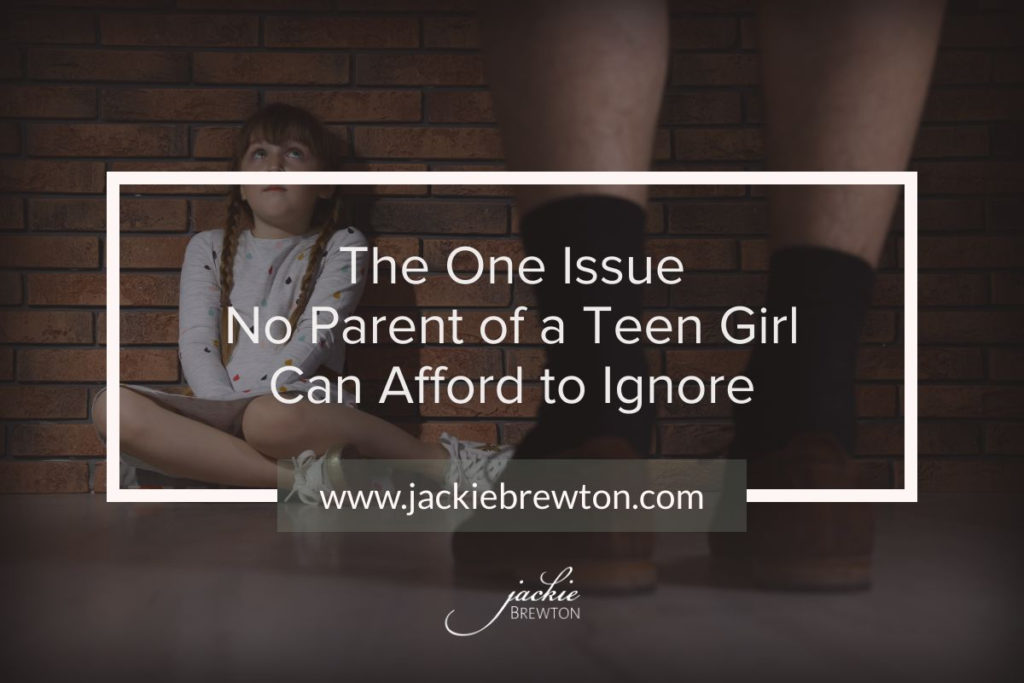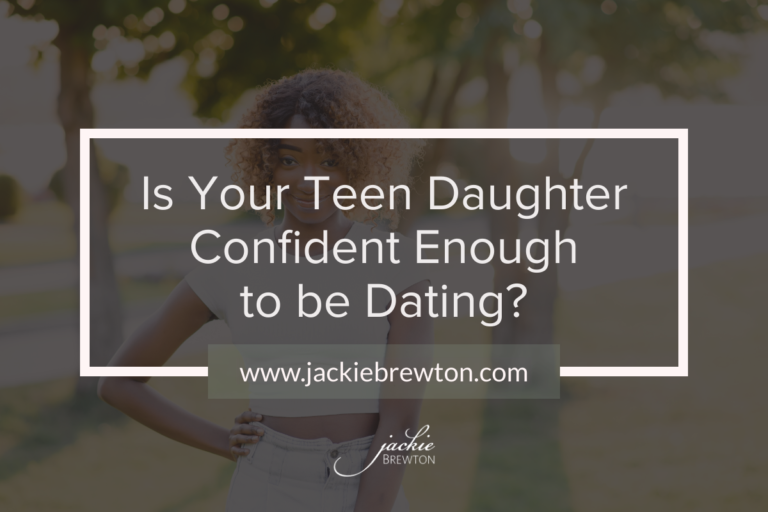The One Issue No Parent of a Teen Girl Can Afford to Ignore

The email messages and direct messages on social media that I receive from students often take me on an emotional roller coaster.
In my last post I shared an Instagram message from a young lady who had been in my class recently that warmed my heart.
No sooner had I read the message that warmed my heart, I received an email message from another young lady that broke my heart.
Even though the following email is difficult to read, I think it’s necessary for you to hear what this 8th grade girl has to say:
You recently came to my school, and I figured I would share a couple things that I haven’t shared with anyone else before.
I’m only 13 and I’ve already struggled with self-harm, substance abuse, and I had a drinking problem.
I have been sexually assaulted multiple times, two being by people I loved most—close family members. I thought it was OK because of the kind words they said to me before and after. But I quickly realized it wasn’t.
The other time I was out in public with my older friends. My current boyfriend at the time had called his friends over to the table where he and I were sitting. They all proceeded to touch me. And when I told him afterward how I felt about him letting them do that, he told me I was asking for it and it wasn’t a big deal.
My body doesn’t feel as if it’s my own anymore. I’m covered in scars and the imaginary handprints I see every time I look at myself as if they had paint on their hands where they touched me.
I want other girls to know they aren’t alone when it comes to this and that it’s not OK. Consent is a thing, and it is ALWAYS mandatory. Thank you for everything you’ve made me realize.
Depressing but Necessary
April is Sexual Assault Awareness and Prevention Month, even though I think there should be awareness brought to this issue every month. That’s just how huge it is.
While at a middle school two weeks ago, I asked the girls to raise their hands if they knew of a teen girl who had been raped or molested.
In all four classes, at least 50% of the girls raised their hands.
The teachers were shocked when they saw how many girls raised their hands, but I wasn’t.
You see, I’ve been asking that question for years and the percentage of girls raising their hands hasn’t changed much at all.
Before they take their hands down, I ask the girls to look around the room to see how many hands are raised so they can see how common the issue is.
I know that some of those girls aren’t raising their hands because they KNOW someone; they are raising their hands because they ARE that someone.
And it doesn’t take long before I find out who those girls are.
I see them fighting back tears when I talk about consent and sexual assault.
They aren’t all successful at fighting back the tears though, as was the case two weeks ago.
Some girls left the classroom in tears, while others visibly cried and were consoled by their friends.
Consent and sexual assault are the last topics I cover during my three days with the middle school girls, and they asked me if I could move the topics to a different place on the agenda so my time with them wouldn’t end on such a heavy/depressing note. [I’m going to try that at my next school.]
3 Tips to Protect Your Daughter
Let’s discuss the above email and how you can use the advice I share in the classroom to protect your daughter.
1. She never told anyone about the sexual assaults.
I can’t tell you how many sexual assaults I’ve had to report because I was the first person the student told, just like the young lady who wrote the above letter.
There are a couple of things I say in class that I believe encourage students to confide in me who have never reported their sexual assault.
The first thing I share is that sexual abuse will never end if no one reports the perpetrators, and very few sexual abusers only abuse once.
I share a story that a woman told me about her sexual abuse at the age of 10 by the 17-year-old son of her parents’ best friends.
When her parents found out about the abuse, they never allowed their friends’ son to babysit her again. But they didn’t report the abuse because they didn’t want to get their best friends’ son in trouble.
While attending Duke University, he was accused of raping a girl on campus. Her parents felt horrible because they realized they may have been able to prevent that rape if they had reported what he did to their daughter.
I think the girls then feel a sense of responsibility to report in order to prevent it from happening to others.
Surprisingly, some girls didn’t even realize they had been assaulted until they heard my definition of sexual assault, which baffles my mind.
“In all honestly, I never knew what that man did to me was so wrong til now.”
~ 8th Grade Girl
I encourage you (and every parent) to have the discussion with your daughter about consent and sexual abuse and ask her whether she’s ever been sexually assaulted.
2. She medicated her pain in unhealthy ways.
This is the second thing I tell students that encourages them to report: “When you don’t report, you’re not getting counseling to deal with a very traumatic event, which could lead you to medicate your pain in very unhealthy ways. This results in you giving the person who violated you in the past the power to continue to harm your future.”
“When you said that sex was usually medication. I know that is what happened to me.
I was hurt because of my father abandoning me soon after he molested me.
Soon after that I began to have sex.”
~High School Junior
The young lady who was in my class obviously medicated her pain in unhealthy ways. She struggled with self-harm, substance abuse and drinking, and she’s only 13!
If your daughter has participated in any of these activities, or any other at-risk behavior, please know there is an underlying reason why she’s doing those things. And it’s very possible a previous sexual assault could be the reason.
3. She felt alone.
I think one of the biggest deterrents of girls reporting their sexual abuse is due to shame, as well as the belief that they are the only one who has been abused/assaulted. Once they realize how common it is, they seem to feel much better and less alone.
“Seeing how many girls raised their hands really touched me as I realized I wasn’t the only one.”
~ 8th Grade Girl
Girls appear much more open to talking about, and even reporting, their sexual assault when they realize others may be able to relate to what they have experienced.
Sexual assault is nothing new unfortunately. So, I recognize many who read this email may have experienced it as well.
If you have been sexually assaulted in the past and discover your daughter has too, it would be helpful if you would share your experience with her.
And please seek professional counseling! For yourselves individually and as a family.
As difficult as this topic is to discuss, I pray this post will encourage you to open the lines of communication with your daughter, so she’ll feel safe and comfortable coming to you if God forbid, she ever needs to report an assault.
“I know plenty of girls that have been raped years ago and they are now telling
their parents that they have been raped after hearing you speak.”
~ 8th Grade Girl
I truly believe there is no one more qualified to serve as a “mandated reporter” than a young lady’s own mother.
P.S. I wish I never had to ask teen girls in my audiences if they know someone who’s been sexually assaulted. I wish I didn’t have to watch middle and high school girls desperately fight back tears every time I get to the consent/sexual assault portion of my presentation. And I wish I didn’t have to report so many sexual assaults month after month, year after year. But that wouldn’t be reality. And that’s why I can’t NOT bring awareness to this issue!
Every parent of a teen girl needs to know sexual assault is more pervasive than they think. So PLEASE take the tips in this post and start talking to your teen daughter (and son), about consent and sexual assault TODAY!
P.P.S. And PLEASE share this post with every parent you know!



